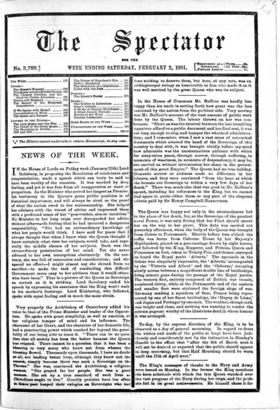In the House of Commons Mr. Balfour was hardly less
happy than his uncle in setting forth how great was the loss sustained by the nation from the political side. Very moving was Mr. Balfour's account of the vast amount of public work done by the Queen. The labour thrown on her was con. tinuous. "Short as was the interval between the last trembling signature affixed to a public document and her final rest, it was vet long enough to clog and hamper the wheels of administra- tion; and I remember, when I saw a vast mass of untouched documents which awaited the hand of the Sovereign of this country to deal with, it was brought vividly before my mind how admirable was the unostentatious patience with which for sixty-three years, through sorrow, through suffering, in moments of weariness, in moments of despondency, it may be, she carried on without intermission her share in the govern- ment of this great Empire." The Queen had no true holiday. Domestic sorrow or sickness made no difference in her labours, and they were continued "from the hour at which Alie became our Sovereign to within a very few days of her death." There was much else that was good in Mr. Balfour's speech, including his references to the King, but we cannot rind space to quote either them or any part of the eloquent tribute paid by Sir Henry Campbell-Bannerman.


































